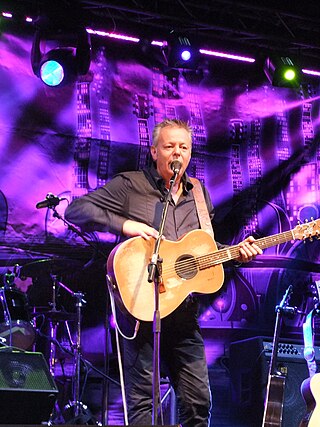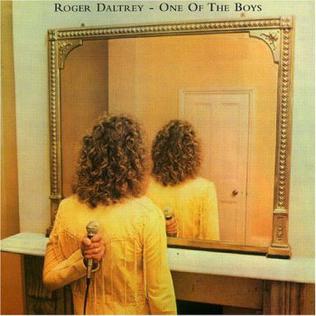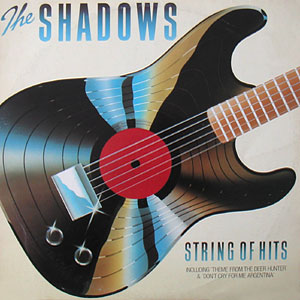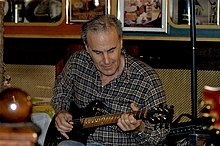
Chester Burton Atkins, also known as "Mister Guitar" and "the Country Gentleman", was an American musician who, along with Owen Bradley and Bob Ferguson, helped create the Nashville sound, the country music style which expanded its appeal to adult pop music fans. He was primarily a guitarist, but he also played the mandolin, fiddle, banjo, and ukulele, and occasionally sang.

An electric guitar is a guitar that requires external amplification in order to be heard at typical performance volumes, unlike a standard acoustic guitar. It uses one or more pickups to convert the vibration of its strings into electrical signals, which ultimately are reproduced as sound by loudspeakers. The sound is sometimes shaped or electronically altered to achieve different timbres or tonal qualities from that of an acoustic guitar via amplifier settings or knobs on the guitar. Often, this is done through the use of effects such as reverb, distortion and "overdrive"; the latter is considered to be a key element of electric blues guitar music and jazz, rock and heavy-metal guitar-playing. Designs also exist combining attributes of the electric and acoustic guitars: the semi-acoustic and acoustic-electric guitars.

Marcel Dadi was a Tunisian-born French virtuoso guitarist known for his finger-picking style which faithfully recreated the instrumental styles of American guitarists such as Chet Atkins, Merle Travis and Jerry Reed. He became a friend of country star Chet Atkins.

Hank Brian Marvin is an English multi-instrumentalist, vocalist, and songwriter. He is known as the lead guitarist for the Shadows.

Raymond Loewy was a French-born American industrial designer who achieved fame for the magnitude of his design efforts across a variety of industries. He was recognized for this by Time magazine and featured on its cover on October 31, 1949.

Merle Robert Travis was an American country and western singer, songwriter, and guitarist born in Rosewood, Kentucky, United States. His songs' lyrics often discussed both the lives and the economic exploitation of American coal miners. Among his many well-known songs and recordings are "Sixteen Tons", "Re-Enlistment Blues", "I am a Pilgrim" and "Dark as a Dungeon". However, it is his unique guitar style, still called "Travis picking" by guitarists, as well as his interpretations of the rich musical traditions of his native Muhlenberg County, Kentucky, for which he is best known today. Travis picking is a syncopated style of guitar fingerpicking rooted in ragtime music in which alternating chords and bass notes are plucked by the thumb while melodies are simultaneously plucked by the index finger. He was inducted into the Nashville Songwriters Hall of Fame in 1970 and elected to the Country Music Hall of Fame in 1977.

Terence "Jet" Harris was an English rock and roll musician. He was an original member of Cliff Richard's backing band the Shadows, serving as the bass guitarist from the group's inception until April 1962, after which he had success as a soloist and as a duo with that band's drummer Tony Meehan.

The Shadows were an English instrumental rock group, who dominated the British popular music charts in the pre-Beatles era from the late 1950s to the early 1960s. They served as the backing band for Cliff Richard from 1958 to 1968, and have joined him for several reunion tours.

Bruce Welch is an English guitarist, songwriter, producer, singer and businessman best known as a founding member of the Shadows.

William Thomas Emmanuel is an Australian guitarist. Originally a session player in many bands, he has released many award-winning recordings as a solo artist. In June 2010, Emmanuel was appointed a Member of the Order of Australia (AM); in 2011, he was inducted into the Australian Roll of Renown. In 2019, he was listed by MusicRadar as the best acoustic guitarist in the world.

"Living Doll" is a song written by Lionel Bart made popular by Cliff Richard and the Shadows in 1959. It was the top selling single in the UK in 1959. It has topped the UK charts twice: in its original version in 1959 and a new version recorded in 1986 in aid of Comic Relief. It is one of the few songs released by a British singer to chart on the American Billboard charts before the British Invasion occurred.

One of the Boys is the third solo studio album by the Who's lead vocalist, Roger Daltrey. It was released in 1977, on Polydor in the UK, and MCA in the US. The sessions were recorded at the Who's Ramport Studios during the winter of 1976, and Daltrey allowed students from the local Battersea technical school to film them as an educational project. This also marked the first time that Daltrey had written or co-written a song since "Here for More" in 1970, and Lisztomania in 1975. Daltrey's original choice for producers were Jerry Leiber and Mike Stoller, but they declined.

"Foot Tapper" is an instrumental by British guitar group the Shadows, released as a single in February 1963. It went to number one in the UK Singles Chart, and was the Shadows' last UK number-one hit.

Summer Holiday is a soundtrack album by Cliff Richard and The Shadows to the film of the same name. It is their second film soundtrack album and Richard's eighth album overall. The album topped the UK Albums Chart for 14 weeks. Three singles from the album were released. Before the album release both "The Next Time" and "Bachelor Boy" had already been hits. This was followed by "Summer Holiday" and lastly "Foot Tapper". All three singles topped the UK Singles Chart.
The Philip Kubicki Factor Bass is a brand of electric bass guitar made in America and sold factory-direct. Bass guitars designed by Kubicki are distinguished by a unique tuning module located in the body of the bass guitar rather than the headstock, as seen on most bass guitars today. The design criteria are based on human factors, or ergonomics, and the belief that a musical instrument should be inspirational to the player.

Galloping Guitar: The Early Years is a multi-disc box-set retrospective recording by American guitarist Chet Atkins, released in 1993 on the Bear Family label.

"Apache" is a song written by Jerry Lordan and first recorded by Bert Weedon. Lordan played the song on ukulele to the Shadows while on tour and, liking the song, the group released their own version which topped the UK Singles Chart for five weeks in mid-1960. The Shadows' guitarist Hank Marvin developed the song's distinctive echo and vibrato sound. After hearing the Shadows' version, Danish guitarist Jørgen Ingmann released a cover of the song in November 1960 which peaked at number 2 on the Billboard Hot 100 in the US.

String of Hits is the twelfth studio album by British instrumental rock group The Shadows, released in 1979 through EMI.

"Atlantis" is a rock music instrumental by British group the Shadows, released as a single in May 1963. It spent 17 weeks on the UK Singles Chart, peaking at number two for two weeks.

"Livin' Lovin' Doll" is a song by Cliff Richard and the Drifters, released in January 1959 as their third single. Unlike their previous two top-ten singles, it only peaked at number 20 on the UK Singles Chart.



















